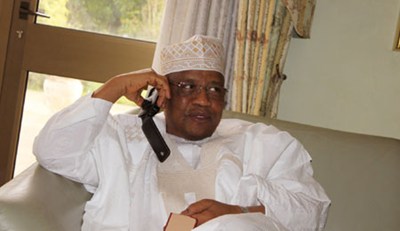
September 8, 2014
/
By:
admin/
- 0 Comments
/
- Nigeria News
Following the rising wave of insurgency in the North-east and the threat to Nigeria’s territorial integrity, members of the National Assembly have set the stage for a meeting with President Goodluck Jonathan so as to end the ceaseless attacks that have led to the death of thousands in recent months and turned several more into refugees.
This is just as the legislators have blamed the regime of former military president, General Ibrahim Babangida, for the flagging performance of the Nigerian Armed Forces in their confrontation with Boko Haram, saying the regime intentionally weakened the military after the failed coup d’etat led by Major Gideon Okar in 1990.
The Chairman, Senate Committee on Defence, Senator George Sekibo (PDP, Rivers), spoke to reporters on their intention to meet with the president at the end of a closed-door meeting the legislators had with the Chief of Defence Staff (CDS), Air Marshal Alex Badeh, yesterday.
Badeh was said to have given a situation report on the emergency rule imposed on Adamawa, Borno and Yobe States to the joint Committees of the Senate and House of Representatives on Defence.
According to Sekibo, during the five-hour meeting, the CDS assured them that the Nigerian armed forces were on top of the Boko Haram situation in the North-east.
He said contrary to speculations, the insurgents were in control of only one o
r two towns in Borno State, but did not mention the towns that had fallen to Boko Haram.
“We’ve heard stories of towns being captured and our armed forces being withdrawn, that is why we invited the CDS to get first-hand information. Based on this meeting, the situation is different from all the speculation.
“We have one or two places where the insurgents have a stronghold, but within a few days, the Nigerian armed forces will take them back,” Sekibo said.
The senator explained that the proposed follow-up meeting with the president on the matter is aimed at seeing if more progress could be made to end the insurgency.
He stated: “We met here from 10 am till 3 pm. That’s about five hours. The purpose is to follow up on the approval of the state of emergency for the third time, so that the presidency will brief us on the progress in those states.”
Sekibo also assured Nigerians that more equipment had been procured to fight the insurgents, pointing out that the troops’ morale which nose-dived in the recent past would be lifted soon.
“The Nigerian armed forces are capable of handling the situation,” he assured the journalists.
“We’ll report the outcome to both chambers and we’ll meet with Mr. President. We believe that the armed forces will overcome this problem in no time,” he said.
The Chairman, House Committee on Defence, Hon. Bashir Adamu (PDP, Jigawa), also explained that a paltry N300 billion out of the N1 trillion in the budget had been released to the military.
He advocated that more funds be released to the military, especially with the security challenges facing the country, so that it could tackle insurgency head on.
He said as politicians, they would meet the president on the matter to discuss it extensively in order to bring lasting peace to the North-east.
Also commenting on the military’s inability to effectively rout the insurgents, Senator Sani Saleh laid the blame squarely on the Babangida regime, who he said went out of its way to weaken the armed forces following the failed coup d’etat of April 22, 1990.
Saleh, who is a member of the Senate Committee on Defence, said the situation in the North-east was deteriorating, insisting that the reason for the deterioration must also be tackled.
“We have heard about our soldiers’ mutiny. It is also our responsibility to find out why that is happening. For us to understand why that is happening, we need to go back to the Babangida era.
“After the 1990 Okar coup, the Federal Government of Nigeria systematically and comprehensively disarmed the military. All the tanks, all the artillery guns were disarmed and locked up.
“All the aircraft were parked in Ilorin and other places, flying stopped, training stopped to ensure the regime’s security and not national security.
“All the good officers of the Nigerian Army were hounded out of the military. And there was an over-concentration of power at the centre which was the army headquarters.
“Prior to that, General Officers Commanding used to have training and manoeuvre grants,” he said.

